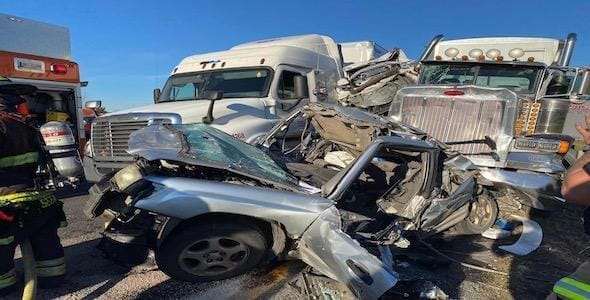Michigan Lawyers Fighting For Trucking Accident Safety
On June 11, 2021, the U.S. Department of Transportation (DOT) announced that new federal laws requiring automatic emergency braking systems in both large commercial trucks and buses should be passed. DOT’s announcement states:
“Safety is the Department’s North Star and making our roads safer for all Americans is critical. The regulatory agenda reflects this – by proposing to make safety technologies like [the] automatic emergency braking standard, to ensure better data collection for autonomous vehicle technology deployments to enable safe innovation, and to update our roadway design and operational practices for the first time in a decade. (“U.S. Department of Transportation Releases Spring …”) Some examples given included:
- Require heavy and light vehicles to include Automatic Emergency Braking…”
What is prompting the call for automatic emergency braking is that rear-end crashes by large commercial trucks and buses are exceptionally dangerous. The question is, will these new federal laws help in an effective way? If you’ve been injured or a loved one has been killed in an accident with a large commercial truck or bus, the Michigan truck accident injury attorneys at The Joseph Dedvukaj Firm, P.C., can help you with your insurance and legal claims. Call today at 866-HIRE-JOE for a free consultation.
What’s Automatic Emergency Braking System?
Automatic Emergency Braking (AEB) system is a type of collision avoidance device designed to automatically be activated to prevent large commercial trucks and buses from colliding with the rear end of any motor vehicle in front of them. Upon activation, the AEB applies the brakes instead of the driver and also determines how much force is needed in braking to bring the rig to a stop before hitting the rear of the vehicle ahead.
The AEB systems are designed varying types. The ARB can be designed for low speeds, while others can be designed for higher speeds. The AEB depends on the different sensors available for different designs, and some systems are designed to just reduce the impact force rather than preventing a crash.
What’s the Downside to AEBs?
Some advocates oppose AEBs because currently designs include the danger of causing serious or even fatal accidents by stopping the vehicle automatically without the involvement of the human driver. Opposing experts also warn loss of control by so-called “phantom braking,” which refers to an AEB false alarm that causes trucks, without warning, to slam on its brakes in response to the detection of a “phantom” object which may or may not be a vehicle, but rather a momentary crossing animal such as a deer.
The Center for Auto Safety stated in a report, “automatic emergency braking goes wrong, it can be incredibly dangerous.” The Center further reports: “Owners of 2017-19 Nissan Rogues equipped with automatic emergency braking have been reporting unwanted stops since the time AEB technology was placed on those vehicles.” Bottom line is there is no substitute for human monitoring and judgment.
Michigan Truck Accident Lawyers Can Help if You’ve Been Injured in a Truck Accident
Truck accidents are always dangerous, but drivers and passengers of smaller passenger vehicles are especially vulnerable to rear-end collisions with a truck. It remains to be seen if Automatic Electronic Brakes can reduce the risk for passenger vehicles crashes. If you or a loved one have been involved in an accident with a truck or bus, a Michigan truck accident lawyers can help with any claims you may have.


